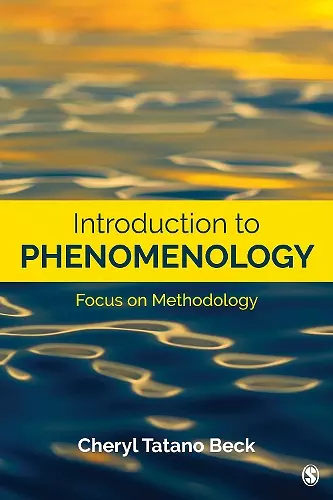Introduction to Phenomenology
Focus on Methodology
Format:Paperback
Publisher:SAGE Publications Inc
Published:1st May '20
Should be back in stock very soon

Phenomenology is a challenging method for many students to understand and apply. Introduction to Phenomenology: Focus on Methodology breaks down the history, methodology, and application so students can more easily write proposals and conduct phenomenological research. Author Cheryl Tatano Beck draws on her depth of experience in applying and teaching phenomenological methods to distill the method into a single guidebook for students and new researchers alike. This introductory book provides a clearer picture of phenomenology as method and its applications to social, behavioral, and health sciences, covering both interpretive and descriptive phenomenology from research design through analysis.
This book is divided into four parts. Part I briefly provides the philosophical underpinnings of descriptive and interpretive (hermeneutic) phenomenology, summarizing the main goals of the original texts. Part II focuses on descriptive phenomenology, while Part III concentrates on interpretive phenomenology. Each type of methodology is covered in its own chapter, with tables comparing the methodologies to one another so readers can better understand the differences and similarities. Part IV addresses evaluating, writing, and teaching phenomenology. Unique chapters on writing a proposal, getting your study published, developing a research program, and preparing to teach phenomenology help complete the cycle of research and help graduate students transition from student to researcher to teacher. Appendices provide study activities for students and examples of two types of phenomenological proposals.
The structural flow of the text makes perfect sense. Beginning with the basic underpinnings, it offers explanations of "why" different methods based on underpinnings exist. Examples help solidify these concepts, which are often overwhelming and unorganized. This text has them all in one place, explained concisely, and provides proper cause/format to compare/contrast to assist in understanding which methodology makes logical sense to use for answering your research question. -- Alexander Jun, Ph.D.
This book was clearly written by a seasoned researcher and expert teacher who understands the complexity of doing phenomenology with quality and rigor with the goal of understanding life experiences of people in a way to provide insight and promote understanding. -- Dr. Suzanne S. Dickerson
This textbook offers a rarely found introduction to a complex philosophy that is also used as a research methodology. It guides students, faculty, and readers into the complex form of research known as phenomenological inquiry in its various styles, and without disappointing the reader throughout. It uses simple language to explain a complex style of human science research. This is a must read for all those who are new to phenomenology, and is especially useful to novice researchers who need to develop a phenomenological research study.
-- Luis Gomez
It addresses a genuine need in qualitative research literature, especially if the author can write clearly about these complex ideas for students and researchers to truly understand what empirical phenomenology is about. Having useful, purposeful examples is a key asset as well. -- Davin J. Carr-Chellman
...this book contributes uniquely to emphasizing the methods and procedures of phenomenological research, and this is an obvious passion and goal of the author. -- Dr. Tyrone Bynoe
There are many strengths of this book, including organizing key authors by descriptive or interpretive phenomenology. Focusing more on analysis, and use of examples for analysis. Explaining how philosophy impacts methods sounds promising. I love the last two chapters: phenomenology proposals, and getting published! I feel this would help me as a faculty member! -- Jason Lawson
ISBN: 9781544319551
Dimensions: unknown
Weight: 340g
224 pages